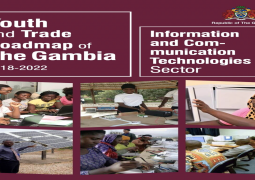
Economic growth and job creation are indeed needed if the labour market is to absorb The Gambia’s youth.
The exclusion of youth from the labour market reinforces cycles of poverty and can ultimately become a risk for social cohesion and stability.
Young men face significant barriers to entry into the Gambian labour market and young women are particularly excluded.
Almost 50% of young women in The Gambia are unemployed, compared to 38% of men in the same age group.
Youth between 15-35 years old represent 34% of the country’s population.
And 45% of the labour force is made up of youth, but most of those youth are either unemployed or underemployed in the informal sector.
The formal labour market has limited capacity to absorb the Gambian youth, and large segments of the youth population work in agriculture or are pushed into the informal services sector with precarious, low-paid and usually low-skilled work conditions.
The Gambian government is working to turn the population challenge into an opportunity for socioeconomic development, as entrepreneurship and self-employment are becoming viable alternatives for youth employment.
The entrepreneurs need financial capital to kick-start or expand their economic activities, to pursue new ventures or to absorb and overcome financial shocks.
Young Gambians, in particular, face a range of barriers accessing finance that prevent them from pursuing sustainable economic activities.
Young Gambians aim to save money for a specific goal.
Specifically, products could target young people who run successful enterprises and seek to accumulate capital to expand activities, or youth planning to accumulate capital to kick off their careers.
The most frequently expressed rationale for savings across the two target regions was to build financial reserves for tough financial times and emergencies.
As such, it is crucial for savings products to warrant a quick release option for young people to enable them to access their money in times of emergencies.
Most youth believe that bank accounts are only beneficial to people with relatively larger sums of money.
Mobile money agents were mostly limited to small towns such as Kerewan and Soma with very little access at the village level.
A strong agent network, however, is crucial for expanding the use of mobile money.
Shopkeepers could play a pivotal role in the distribution and promotion of mobile money services.
Many young people have heard of mobile money, but have barely used it.
Read Other Articles In Youth Forum
Young women use technology, tourism to transform their communities
Oct 3, 2023, 12:04 PM




